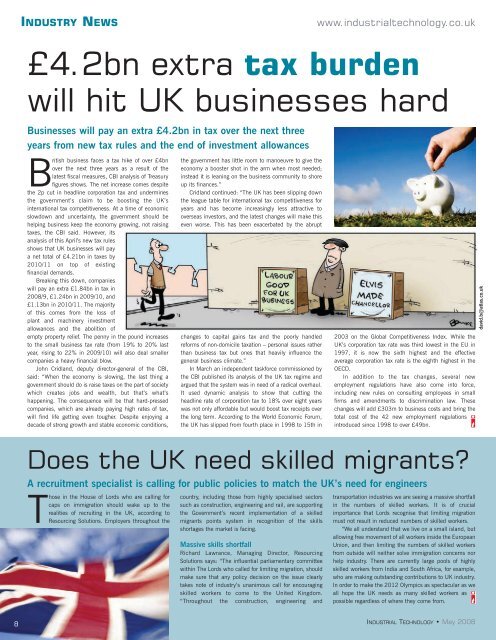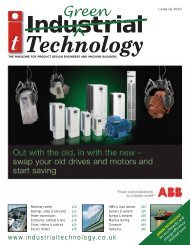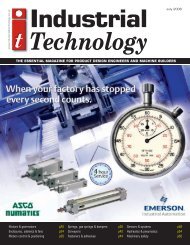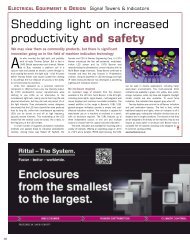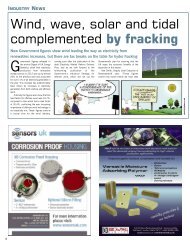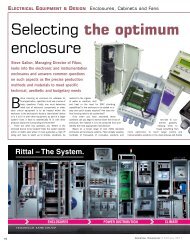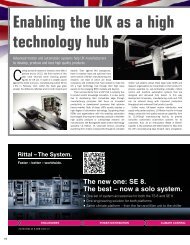sensors & systems - Industrial Technology Magazine
sensors & systems - Industrial Technology Magazine
sensors & systems - Industrial Technology Magazine
You also want an ePaper? Increase the reach of your titles
YUMPU automatically turns print PDFs into web optimized ePapers that Google loves.
INDUSTRY NEWS<br />
www.industrialtechnology.co.uk<br />
£4.2bn extra tax burden<br />
will hit UK businesses hard<br />
Businesses will pay an extra £4.2bn in tax over the next three<br />
years from new tax rules and the end of investment allowances<br />
British business faces a tax hike of over £4bn<br />
over the next three years as a result of the<br />
latest fiscal measures, CBI analysis of Treasury<br />
figures shows. The net increase comes despite<br />
the 2p cut in headline corporation tax and undermines<br />
the government’s claim to be boosting the UK’s<br />
international tax competitiveness. At a time of economic<br />
slowdown and uncertainty, the government should be<br />
helping business keep the economy growing, not raising<br />
taxes, the CBI said. However, its<br />
analysis of this April’s new tax rules<br />
shows that UK businesses will pay<br />
a net total of £4.21bn in taxes by<br />
2010/11 on top of existing<br />
financial demands.<br />
Breaking this down, companies<br />
will pay an extra £1.84bn in tax in<br />
2008/9, £1.24bn in 2009/10, and<br />
£1.13bn in 2010/11. The majority<br />
of this comes from the loss of<br />
plant and machinery investment<br />
allowances and the abolition of<br />
empty property relief. The penny in the pound increases<br />
to the small business tax rate (from 19% to 20% last<br />
year, rising to 22% in 2009/10) will also deal smaller<br />
companies a heavy financial blow.<br />
John Cridland, deputy director-general of the CBI,<br />
said: “When the economy is slowing, the last thing a<br />
government should do is raise taxes on the part of society<br />
which creates jobs and wealth, but that’s what’s<br />
happening. The consequence will be that hard-pressed<br />
companies, which are already paying high rates of tax,<br />
will find life getting even tougher. Despite enjoying a<br />
decade of strong growth and stable economic conditions,<br />
the government has little room to manoeuvre to give the<br />
economy a booster shot in the arm when most needed;<br />
instead it is leaning on the business community to shore<br />
up its finances.”<br />
Cridland continued: “The UK has been slipping down<br />
the league table for international tax competitiveness for<br />
years and has become increasingly less attractive to<br />
overseas investors, and the latest changes will make this<br />
even worse. This has been exacerbated by the abrupt<br />
changes to capital gains tax and the poorly handled<br />
reforms of non-domicile taxation – personal issues rather<br />
than business tax but ones that heavily influence the<br />
general business climate.”<br />
In March an independent taskforce commissioned by<br />
the CBI published its analysis of the UK tax regime and<br />
argued that the system was in need of a radical overhaul.<br />
It used dynamic analysis to show that cutting the<br />
headline rate of corporation tax to 18% over eight years<br />
was not only affordable but would boost tax receipts over<br />
the long term. According to the World Economic Forum,<br />
the UK has slipped from fourth place in 1998 to 15th in<br />
2003 on the Global Competitiveness Index. While the<br />
UK’s corporation tax rate was third lowest in the EU in<br />
1997, it is now the sixth highest and the effective<br />
average corporation tax rate is the eighth highest in the<br />
OECD.<br />
In addition to the tax changes, several new<br />
employment regulations have also come into force,<br />
including new rules on consulting employees in small<br />
firms and amendments to discrimination law. These<br />
changes will add £303m to business costs and bring the<br />
total cost of the 42 new employment regulations<br />
introduced since 1998 to over £49bn.<br />
david.b@atlas.co.uk<br />
Does the UK need skilled migrants?<br />
A recruitment specialist is calling for public policies to match the UK’s need for engineers<br />
Those in the House of Lords who are calling for<br />
caps on immigration should wake up to the<br />
realities of recruiting in the UK, according to<br />
Resourcing Solutions. Employers throughout the<br />
country, including those from highly specialised sectors<br />
such as construction, engineering and rail, are supporting<br />
the Government’s recent implementation of a skilled<br />
migrants points system in recognition of the skills<br />
shortages the market is facing.<br />
Massive skills shortfall<br />
Richard Lawrance, Managing Director, Resourcing<br />
Solutions says: “The influential parliamentary committee<br />
within The Lords who called for limiting migration, should<br />
make sure that any policy decision on the issue clearly<br />
takes note of industry’s unanimous call for encouraging<br />
skilled workers to come to the United Kingdom.<br />
“Throughout the construction, engineering and<br />
transportation industries we are seeing a massive shortfall<br />
in the numbers of skilled workers. It is of crucial<br />
importance that Lords recognise that limiting migration<br />
must not result in reduced numbers of skilled workers.<br />
“We all understand that we live on a small island, but<br />
allowing free movement of all workers inside the European<br />
Union, and then limiting the numbers of skilled workers<br />
from outside will neither solve immigration concerns nor<br />
help industry. There are currently large pools of highly<br />
skilled workers from India and South Africa, for example,<br />
who are making outstanding contributions to UK industry.<br />
In order to make the 2012 Olympics as spectacular as we<br />
all hope the UK needs as many skilled workers as<br />
possible regardless of where they come from.<br />
8<br />
INDUSTRIAL TECHNOLOGY • May 2008


